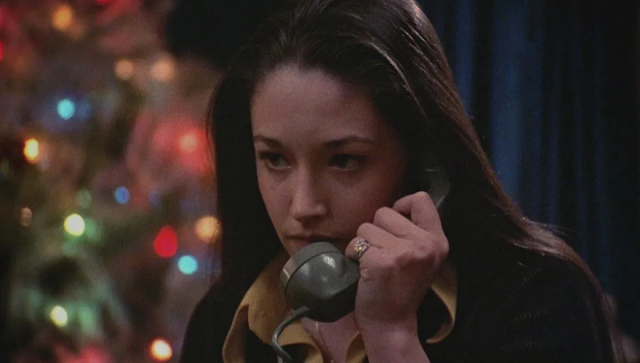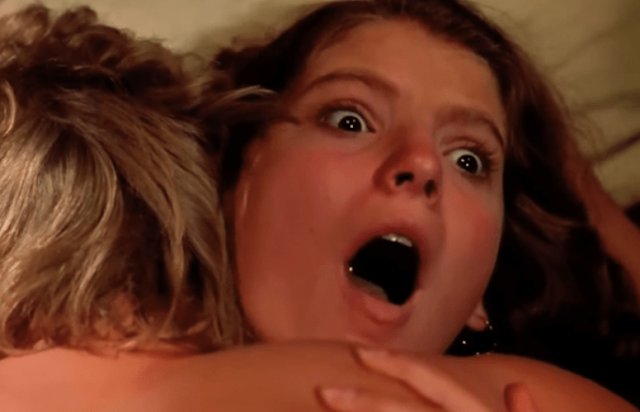Are the Black Christmas remakes as bad as we remember?
'Tis the season for Christmas horror - and what better choice than Black Christmas? But after sticking on the beloved 1974 original, is it also time to revisit the two critically panned remakes? Could the 2006 and 2019 versions of Black Christmas be better than we remember?
I scoured the net for people willing to stick their neck out and defend the remakes - and it wasn't hard to find convincing defences of both films.
But do they have a point? Is it time to readmit these modern horror films to the Christmas hearth, or is there no room at the inn?
Mulled wine in hand - let's take each major defence of the remakes one at a time. Be warned, there will be spoilers for all three films ahead.
The 2006 Black Christmas brings a welcome helping of gore and grindhouse nastiness (Morbidly Beautiful, Bloody Disgusting)
The only thing in 1974's Black Christmas that could potentially disappoint slasher fans is the lack of gore - almost all of the kills take place mostly offscreen.
But it's no longer the 70s, and the 2006 remake offered the opportunity for some hard gore and eye-catching practical effects.
Director Glen Morgan certainly spilled buckets of blood - but again a good quantity of this is offscreen blood spatter.
The kills we do get to see become grimly repetitive. The infamous bag suffocation from the original is repeated ad nauseum. One gouged-out eyeball may be shocking, but by the time we get to our tenth it's yawn-inducing, especially since the effects are so unconvincing they reminded me of this moment from Friday the 13th Part 3:
My problem is blood and popped eyeballs on their own are not enough. A good slasher needs creative kills with a variety of deadly implements. Morgan doesn't deliver.
Billy's backstory in the 2006 Black Christmas enjoyably trades subtlety for audacity (ComingSoon.net)
We never discover the identity of the killer in 1974's Black Christmas - all we learn is that he's probably called Billy, and is having conversations in his head with someone called Agnes.
Going the way of Rob Zombie's Halloween - released a year later - Morgan gives us lengthy flashbacks offering a detailed insight into Billy and Agnes' traumatic upbringing.
Matt Serafini from ComingSoon.net is a fan of the film's decision to depict Billy's backstory with "tasteless relish", noting its playful riff on the traumatic childhood incident which motivates many slasher villains - e.g. Michael Myers' murder of his sister; Jason Voorhees' surprisingly non-fatal drowning; whatever was going in with the NSFW jigsaw in Pieces.
I'm not entirely sure what I think of quite how OTT Billy's backstory is. The decision to give him yellow skin is bizarre. His rape at the hands of his mother pushed the boundaries of taste - arguably not in a fun way - and then turning the child of this assault into a serial killer too is probably crossing a line.
The flesh cookies are fun though. Who doesn't love flesh cookies?
One of the strongest elements of the original Black Christmas was the mystique surrounding the killer - we never even get a proper look at his face. Feeling the need to mix things up for a remake is understandable, but Morgan's execution is just odd.
The 2019 Black Christmas is a rare example of an ideas-driven slasher (Variety)
Moving onto the 2019 Black Christmas, the most divisive thing for many viewers and critics is its upfront political message. It's worth noting that some of the backlash to the movie is from people objecting to its feminist themes.
I appreciated how co-writers Sophia Takal and April Wolfe engaged with contemporary concerns about rape culture, monuments to slave owners and whitewashed uni syllabuses. But the argument that the 2019 Black Christmas is somehow an outlier in infusing a slasher film with a political message seems to come from people who don't like horror films very much.
The original Black Christmas, for instance, came a year after the Roe v Wade ruling which started to allow women autonomy over their own bodies when it came to abortion, making the subplot about Jess's (Olivia Hussey) unwanted pregnancy more revolutionary than modern viewers might think.
There are a tonne of slasher films, both recent and modern, that engage with sociopolitical themes. The trouble with the 2019 Black Christmas is it trips over its own ideas in its rushed third act. The reveal that the bust of Calvin Hawthorne is giving frat boys magical powers to become an army of meninists is probably meant to be a metaphor for how the legacy of patriarchy turns men into monsters, but it's clumsily executed.
Surely having the male villains possessed by black goo frees them from responsibility for their actions? Why does smashing Hawthorne's bust seem to kill some of the masked frat boys, but Landon (also possessed at this point) is fine? Why is the black goo necessary when the hooded assailants aren't any more effective than your average masked killer? How is killing a bunch of feminist students a sustainable strategy for maintaining male oppression long term?
In short, the political subtext is welcome, it's just poorly executed.
The 2019 Black Christmas's PG-13 rating makes it a great gateway horror film (Dread Central)
Going in the opposite direction to the 2006 remake, 2019's Black Christmas tones down the gore to get a PG-13 remake.
Wolfe explained at the time on Twitter: "We wrote it with an R in mind. When they did the test screenings, [it] was clear that this movie needed to be available to a younger female audience because the subject matter is timely. Also I want to indoctrinate girls into horror. Doesn’t make it any less vicious!"
This rating works in its favour according to Dread Central's Chad Collins, who said the movie was "exactly the kind of cinematic springboard that might inspire [younger viewers] to seek out other genre titles".
While I'd argue Mike Flanagan's Ouija: Origin of Evil or Christopher Landon's Happy Death Day are better examples of PG-13 horror, the rating doesn't hamper the film anywhere near as much as it could have done.
There are some enjoyably tense moments - particularly in the home invasion sequence, which is reminiscent of You're Next in the best way possible. There's a nice shoutout to the famous Exorcist 3 jump scare featuring Christmas lights. Lindsay's (Lucy Currey) snow angel death sequence is far more inventive than anything in the 2006 remake.
Accompany these well-executed moments with themes that are more relevant to a younger audience, and it's not hard to imagine younger viewers who liked Black Christmas starting to see horror as a genre relevant to their own experiences and concerns and seeking out other titles.
So I'll take Black Christmas as a gateway horror flick - although it will likely disappoint more seasoned fans.
If this has whet your appetite for slasher content, why not check out our top ten slasher kills?












Comments
Post a Comment